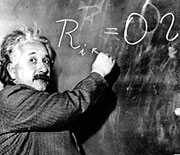 |
| Einstein writes an
equation for the density of the Milky Way on the blackboard at
the Carnegie Institute, Mt. Wilson Observatory headquarters in
Pasadena,
California. | |
He stopped traffic on Fifth Avenue like the Beatles or Marilyn Monroe.
He could've been president of Israel or played violin at Carnegie Hall,
but he was too busy thinking. His musings on God, love and the meaning
of life grace our greeting cards and day-timers.
Fifty years after his death, his shock of white hair and droopy
mustache still symbolize genius.
Einstein remains the foremost scientist of the modern era. Looking back
2,400 years, only Newton, Galileo and Aristotle were his equals.
Around the world, universities and academies are celebrating the 100th
anniversary of Einstein's "miracle year" when he published five scientific
papers in 1905 that fundamentally changed our grasp of space, time, light
and matter. Only he could top himself about a decade later with his theory
of general relativity.
Born in the era of horse-drawn carriages, his ideas launched a dazzling technological revolution
that has generated more change in a century than in the previous two
millennia.
Computers, satellites, telecommunication, lasers, television and
nuclear power all owe their invention to ways in which Einstein peeled
back the veneer of the observable world to expose a stranger and more
complicated reality underneath.
Yet there is more, and it is why Einstein transcends mere genius and
has become our culture's grandfatherly icon.
He escaped Hitler's Germany and devoted the rest of his life to
humanitarian and pacifist causes with an authority unmatched by any
scientist today, or even most politicians and religious leaders.
He used his celebrity to speak out against fascism, racial prejudice
and the McCarthy hearings. His FBI file ran 1,400 pages.
His letters reveal a tumultuous personal life -- married
twice and indifferent toward his children while obsessed with physics. Yet
he charmed lovers and admirers with poetry and sailboat outings. Friends
and neighbors fiercely protected his privacy.
(Agencies) |
他曾像披頭士和瑪莉蓮·夢(mèng)露一樣讓第五大道交通阻塞,他本可以成為以色列總統(tǒng),或在卡內(nèi)基音樂(lè)廳演奏小提琴,但他卻把時(shí)間都用來(lái)思考。他對(duì)上帝、真愛(ài)以及人生意義的思考時(shí)常出現(xiàn)在賀卡和臺(tái)歷上。
在他去世50年后,他那一頭濃密的白發(fā),微垂的兩撇“八”字胡仍是天才的象征。
愛(ài)因斯坦依然是現(xiàn)代最偉大的科學(xué)家,即使是追溯歷史,在過(guò)去的2400年中,也只有牛頓、伽利略和亞里士多德才能與之比肩。
今年剛好是愛(ài)因斯坦“奇跡年”一百周年紀(jì)念,世界各地的大學(xué)和研究機(jī)構(gòu)都在紀(jì)念具有傳奇色彩的1905年,因?yàn)樵谀且荒辏瑦?ài)因斯坦發(fā)表了五篇科學(xué)論文,從根本上改變了人們對(duì)空間、時(shí)間、光和物質(zhì)的理解,也只有他自己才能在10年后再次超越自己,提出了廣義相對(duì)理論。
愛(ài)因斯坦出生在馬車盛行的年代,但他的理論和思想?yún)s引發(fā)了一場(chǎng)令人目不暇接的科學(xué)技術(shù)革命。在短短百年中,這場(chǎng)科技革命帶來(lái)的的變化遠(yuǎn)比以往2000年來(lái)變化的總和還要多。
計(jì)算機(jī)、人造衛(wèi)星、電子通訊、激光、電視以及原子能的創(chuàng)造發(fā)明都?xì)w功于愛(ài)因斯坦提出的研究方法:剝離可見(jiàn)世界的偽裝,探索在隱藏在表層之下的更為陌生和復(fù)雜的真相。
當(dāng)然愛(ài)因斯坦意味的并不僅僅是這些,他已經(jīng)超越了科學(xué)天才的范疇,成為人類文明中德高望重的偶像。
二戰(zhàn)時(shí)期,他逃離了希特勒統(tǒng)治下的德國(guó)并把他的余生都獻(xiàn)給了人道主義與和平主義事業(yè)。他的影響力和威望是當(dāng)今任何科學(xué)家和大多數(shù)的政治或宗教領(lǐng)袖都不能企及的。
作為公眾人物,愛(ài)因斯坦常常站出來(lái)抨擊法西斯主義、種族歧視以及當(dāng)時(shí)美國(guó)當(dāng)權(quán)者提出的“麥卡錫主義”。在美國(guó)聯(lián)邦調(diào)查局的檔案里,關(guān)于他的記錄多達(dá)1400頁(yè)。
愛(ài)因斯坦的書(shū)信揭示了他不尋常的個(gè)人生活:他結(jié)過(guò)兩次婚;每當(dāng)專注思考物理問(wèn)題時(shí),他就會(huì)對(duì)身邊的子女漠不關(guān)心;但是,他也會(huì)“利用”詩(shī)歌和帆船航行來(lái)吸引他的愛(ài)人和仰慕者。他的朋友和鄰居們都極力保護(hù)他的隱私。
(中國(guó)日?qǐng)?bào)網(wǎng)站譯) |
